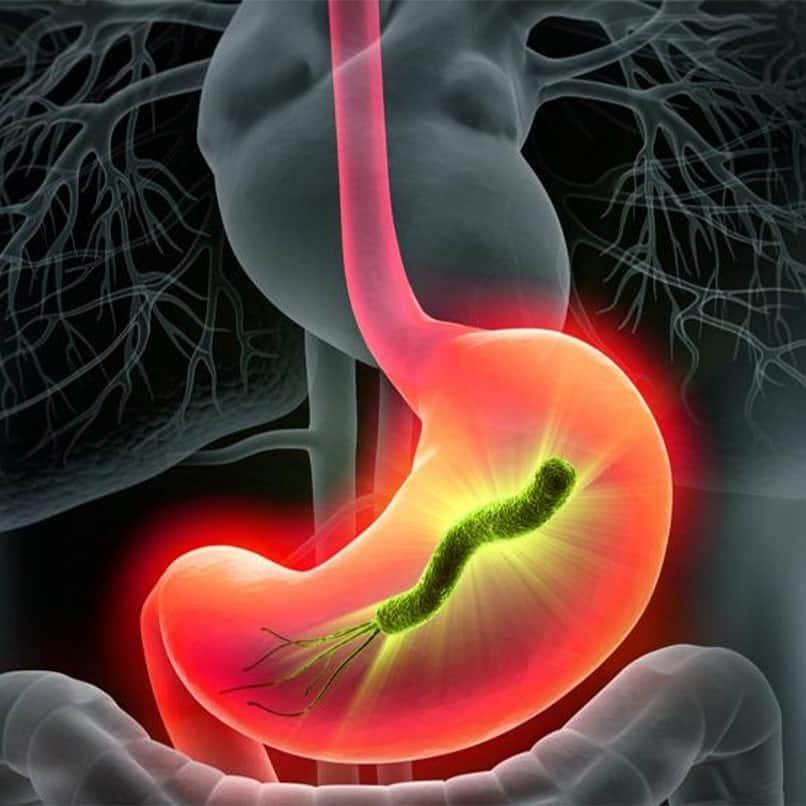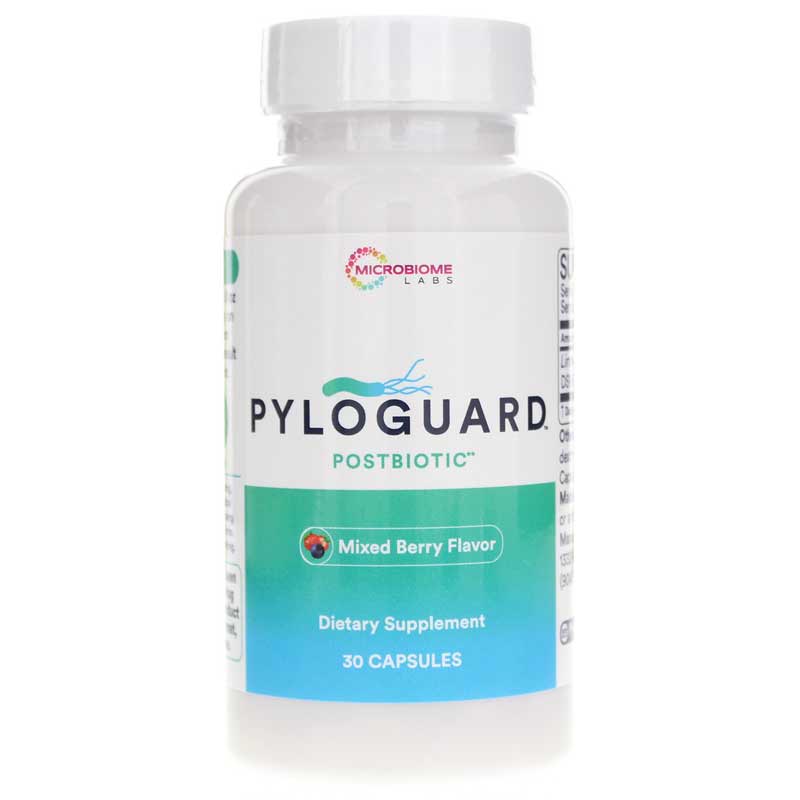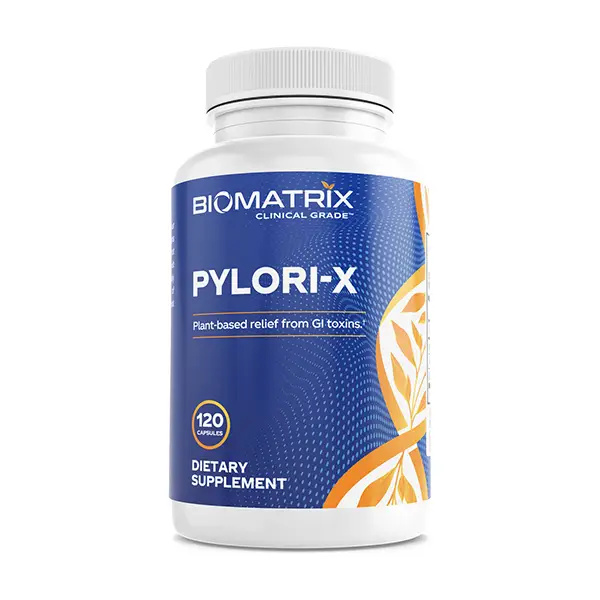Last updated on December 20th, 2022 at 10:16 pm
Chances are, you likely haven’t heard of H. pylori bacteria and that means you may not have heard of h pylori natural treatment. If you haven’t heard that’s because although around 44% of people worldwide have H Pylori in their system and it tends to be harmless (1). For many afflicted with it, no symptoms present themselves for them to ever be a bother.
But for those who do suffer from symptoms such as gastric inflammation, knowing how to treat them is likely what brought you to this article. First, we’ll discuss what it is, what causes it, and how you test for it. Next, we’ll dive into the different treatments, both antibiotics and natural.
Lastly, we’ll suggest the top natural h pylori supplements that can not only work to treat some negative symptoms you may be feeling but also promote a healthy gut environment so that you are at a lower risk of becoming infected again.
Ready to dig in and know more about H. pylori bacteria? Let’s get started.
What is H. Pylori Bacteria?
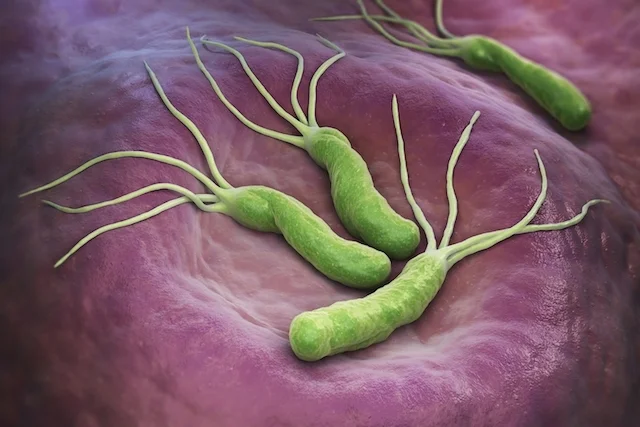
Also known as Helicobacter Pylori, it is a type of bacteria that infects the small bowel and the stomach. In 1982, two Australian researchers discovered it when they observed its connection to peptic ulcer disease (2).
Most people are infected with H. pylori in childhood, and although that can sound scary, studies show that it likely has a protective effect. It helps to regulate ghrelin, also called the hunger hormone, without which children may not be able to register that full feeling (3).
Symptoms of H. Pylori Bacteria
Those that suffer from the harmful side of H. pylori may experience symptoms when the bacteria damage the inner protective lining of the stomach (4). These symptoms may include:
- Nausea or indigestion
- Bloating or swelling
- Dull or burning stomach pain
- Mysterious weight loss
- Poor appetite or feeling full quickly
- Burping
- Vomiting
Often these indicators are worse when the stomach is empty or the hour is late in the day. These symptoms are also linked to peptic stomach ulcers – not to be confused with ulcerative colitis – and although temporary relief may be found by taking an antacid, finding permanent relief is always preferred.
In some cases, stomach cancer can be a devastating result and although symptoms can be similar to the above, they can also include:
- Stronger stomach pain
- Blood in the stool
- Tiredness or weakness
When facing any of the above symptoms, it is always advisable to talk with your healthcare professional to get a proper diagnosis and treatment.
What Is the Main Cause of H. Pylori?
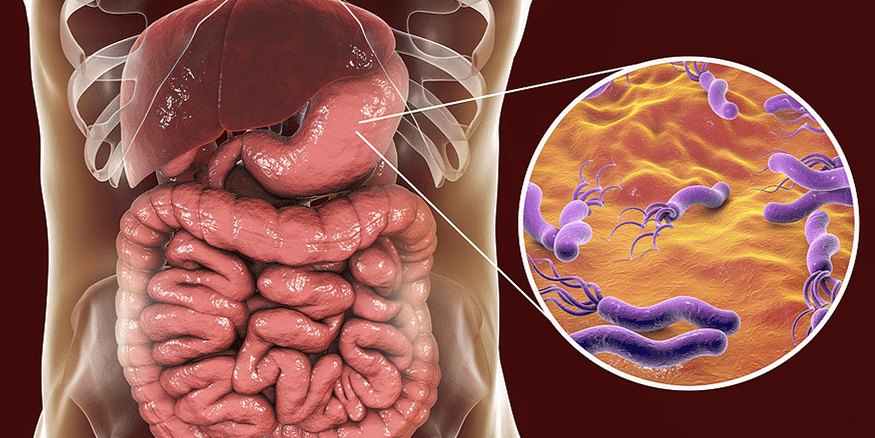
So now you are likely wondering, how do people get H pylori? An infection occurs when the bacterium enters your stomach. This usually occurs from direct contact with another person, such as through kissing, or through contact with vomit or diarrhea. We know, that’s gross.
Someone can also be infected by contaminated water or food (5). Your chances of contracting it are greater if you live in a developing country, live without a reliable source of water, live in a crowded home, or live with someone who also has it.
How Do You Test for H. Pylori?
First, if you suspect you may have it, visit your doctor and discuss your symptoms. They will likely run a blood test, a stool test, or a breath test. A blood test checks for antibodies (infection-fighting cells) to H. pylori. The breath test also known as a urea breath test, will check for abnormal carbon dioxide levels, a potential sign of an infection. It also can measure other substances in your breath that may indicate an H. Pylori infection.
Your healthcare provider might order a stool antigen or stool culture test. A stool antigen test looks for antigens to H. PYlori in your stool. Antigens are substances that trigger an immune response.
If the above tests are inconclusive, your doctor may then suggest having you undergo an endoscopy. This is the best test. The procedure takes a closer look at your stomach lining, esophagus, and small intestine. Images and a small biopsy will help your doctor better determine if you have it.
What Is the First Line of Treatment for H. Pylori?

First, let’s clarify that there is no reason to treat yourself for H. pylori unless you suspect that the effects have become harmful, and you are suffering from the previously listed symptoms. Many doctors believe that eradicating H. pylori should be case specific.
In some cases, removing the bacteria can lead to more problems such as increased nausea, acid reflux, esophageal inflammation, and possibly cancer. This is particularly true if the H. pylori bacteria was providing a protective effect (6).
Typically, the first line of treatment for H. pylori is a round of antibiotics and a proton-pump inhibitor, the latter of which reduces stomach acid. In most cases, this treatment is only needed once to remove the bacteria.
Now, although most doctors advise going this route, we wouldn’t be us if we didn’t talk about other possible treatments. Just because the above is the typical first line of treatment doesn’t mean it is the most effective, that it suits everyone who has it, and it certainly isn’t a natural treatment for H. pylori, which some people prefer. This leads us to our next question regarding natural treatments.
Can H. Pylori Be Healed Without Antibiotics?
As with most health conditions, more studies are needed, but one study did show the disappearance of H. pylori without the use of antibiotics in 12 patients(7). We believe that there certainly is good reason to give some of the natural treatments a try. Let’s look at the most promising.
H. Pylori Natural Treatment
Depending on the severity of your infection, you may choose a natural treatment approach for H. pylori. Interestingly, many of these approaches go hand-in-hand with maintaining a well-balanced lifestyle, one that includes good hygiene.
Be sure to wash your hands after you use the facilities and before you eat. Always drink from a safe water source, and don’t eat food that hasn’t been properly cleaned. In some cases, although you may be experiencing gut-wrenching pain, you may be suffering from something unrelated to H. pylori.
Beyond getting tested to see if you suffer from this bacteria, you may also elect to get your microbiome tested. This will help you determine the amount of good and bacteria in your gut and may help you decide if you would like to try our following natural treatment, probiotics.
Probiotics

Just as with any good action movie, we need the good guys and the bad guys. But in our bodies, these characters would otherwise be good bacteria and bad bacteria. Sometimes, as with any action movie, the bad guys take over, and it’s up to the good guys to take them down.
This can be done through a probiotic supplement or by eating foods high in probiotics, such as yogurt, sourdough bread, buttermilk, and kefir. Probiotics help keep our bodies healthy and working well and fight off the bad bacteria when there is too much.
If you choose to go the antibiotic route, probiotics are a great supplement to eradicating H. pylori. Lactobacillus acidophilus, specifically, is the probiotic believed to deliver the best results (8). We’ll look at specific supplements you can take later in this article.
It is the hope, however, that if H. pylori bacteria has changed from a good guy to a bad guy – plot twist – and is causing your body harm, by taking probiotics, you may be able to bring the bad bacteria back to the good side. You may want to also include some prebiotics with your probiotics, as the prebiotics feed the probiotics. Strengthening your mucosal lining is also very important to make sure pathogens are not getting from your intestines into your bloodstream. When this happens your body can suffer inflammation as it works to fight off the pathogens.
Tea
Studies have shown that tea can be a factor in reducing H. pylori bacteria (9). But you may be wondering, what kind of tea? Tea, in general, is rich in polyphenols. Polyphenols are compounds found in plant-based foods and act as an antioxidant.
Antioxidants work to inhibit oxidation, a chemical reaction that can damage cells within our bodies. All teas contain polyphenols, but some have different proportions. Green tea, for example, is richest in epigallocatechin-3 gallate while black tea is richest in theaflavins (10).
Either way, these polyphenols work to alleviate inflammation. So, if you are suffering from an ulcer due to an H. pylori infection, adding tea to your diet may aid in making you feel better. And if you want to improve this natural treatment for H. pylori, even more, try adding some honey to your tea.
Honey

In the same study we mentioned for tea(11), honey has also shown promise in reducing infection. This is because honey can inhibit bacterial growth (12). Winnie the Pooh was clearly onto something with his honey eating. Most would advise raw versus heated honey, but depending on the temperature of your tea, you may not lose as much of its antibacterial properties as you think.
Broccoli Sprouts
Another promising study(12) showed that the daily consumption of broccoli sprouts may eradicate H. pylori bacteria. So, what’s the secret to broccoli sprouts? Well, they contain sulforaphane, a compound known for its antioxidant, antimicrobial, and anti-inflammatory properties (13).
If you decide to take the broccoli sprout route, make sure to wash them well as they have a high risk for bacterial contamination. You may choose instead to consume broccoli sprout powder, that is if you can get your hands on some.
Cranberry, Ginger, Garlic, Curcumin, and Pistacia Gum

We’ve grouped these five because through our research we came across a study that examined them all, (14) the findings of which we will now share with you. But before we get into that, first let us discuss a couple of key terms, in vitro and in vivo.
In vitro is within a glass, such as a petri dish, and in vivo is within a living organism. So, why does this matter? Because although something can look extremely promising when studied in a petri dish, we don’t live in petri dishes.
We are living organisms and cures don’t always translate from the dish to our bodies. It also can take time for a study to move beyond in vitro to in vivo, which is where we need it to be to truly know its worth. Now, let’s take a deeper look at each one.
Cranberry
Cranberries or cranberry juice are known for their Vitamin C content, their ability to cure a urinary tract disease, and can make a delicious cocktail. Concering an H. pylori treatment, however, more research is needed.
In vitro, cranberry juice can prevent the H. pylori bacteria from adhering to the human gastric mucosa. Positive results in treating a Helicobacter Pylori infection in humans in vivo were shown in a study over a decade ago, but more testing is needed to be considered truly effective.
Ginger
If you have ever had nausea, you may have reached for something containing ginger, such as ginger ale, ginger candy, or even ginger tea. That’s because ginger is great for treating gastrointestinal ailments, is high in antioxidants, and is a natural anti-inflammatory. Ginger is also used regularly in Ayurveda medicinal practices.
In one study Mongolian gerbils, who were infected with H. pylori, were given ginger extract as a treatment. It showed reduced infection and inflammation. In most other studies where ginger was applied in vitro situations, the growth of the bacteria was impeded. Further studies in vivo need to be conducted to know more.
Garlic
Garlic, besides its amazing ability to take mashed potatoes to the next level, is known for its ability to fight off bacteria, viruses, and more. It’s no wonder then that it would be put to the test as a possible H pylori natural treatment. But what is it in garlic that makes it so special?
Garlic contains an active compound called allium. This compound has been used for centuries for its medicinal properties, including fighting off infections. It is possible, therefore, that high concentrations of garlic may be used to inhibit the growth of H. pylori.
Curcumin
Say the word curcumin, and many will not know what you mean. Say turmeric, and everyone knows this vibrant-colored spice used in Indian cuisine. Curcumin is the most active component of turmeric and is the running force behind its anti-infectious, anti-inflammatory, anti-mutagen, and antioxidant properties.
Curcumin has shown great results in a clinical trial to eliminate stomach ulcers and reduce symptoms associated with peptic ulcers, including abdominal pain and stomach lining issues. Although these results are encouraging, more research is needed to ensure curcumin is a complete natural treatment for H. pylori. If you’re looking for a curcumin supplement check out this video on how to choose the best tumeric supplement.
Pistacia Gum
Pistacia lenticus is an evergreen shrub or tree that comes from the Mediterranean; it produces a unique resin. Although this plant can be replanted elsewhere, it loses its ability to produce the ever-important resin.
Like curcumin, mastic has a positive effect on stomach ulcers. Many of the studies done were conducted in vitro or on animals, such as mice. To determine how effective it would be in vivo to eradicate H. Pylori, more studies are needed.
Phototherapy

Light therapy, also known as phototherapy, is used to treat many mental health conditions including depression or seasonal affective disorder (SAD). But it has also been used in tandem with curcumin in a 2020 study(15).
The belief was that when curcumin isn’t enough to eradicate the bacteria, phototherapy gives an added benefit and resulted in less tissue damage and production of H. pylori. It may also be a viable option for those wanting to avoid antibiotics.
The Best H. Pylori Natural Supplement Treatments
Now that we have discussed a variety of natural treatment options, including many which come from food, let’s look at some natural supplements. Although there is no guarantee that these alternative treatments will cure the infection, they may provide some relief from symptoms and may help repair damage and strengthen your gut health.
Microbiome Labs Pyloguard
This supplement contains Lactobacillus reuteri, a bacterium that works to support overall digestive health by binding to H. pylori in the stomach lining and helping to remove them through the digestive tract. It also works to support the microbiome, which if you recall, is where the good and bad bacteria reside. This is enhanced by taking Biocidin Botanicals GI Detox to help bind and transport the dead bacteria out of your system.
Biomatrix Pylori-X
This dietary supplement contains a variety of compounds, including the aforementioned mastic gum, to work in harmony and support your GI tract health and your stomach lining. We like it for its ability to care for gastric issues you may be experiencing.
Douglas Labs Pylori-Plex
Another dietary supplement that contains mastic gum, is said to have gut-soothing properties and may aid in balancing H. pylori bacteria. In taking this supplement, you can look to soothe and support your digestive health and promote a healthy intestinal lining. It is vegetarian, gluten, and dairy-free.
Nutridyn Pyloristat
Containing two of the H. pylori natural remedies, ginger and mastic gum, this supplement works to support healthy gut bacteria, promote an optimal gastrointestinal environment, and antioxidant immune support.
Microbiome Labs MegaSporeBiotic
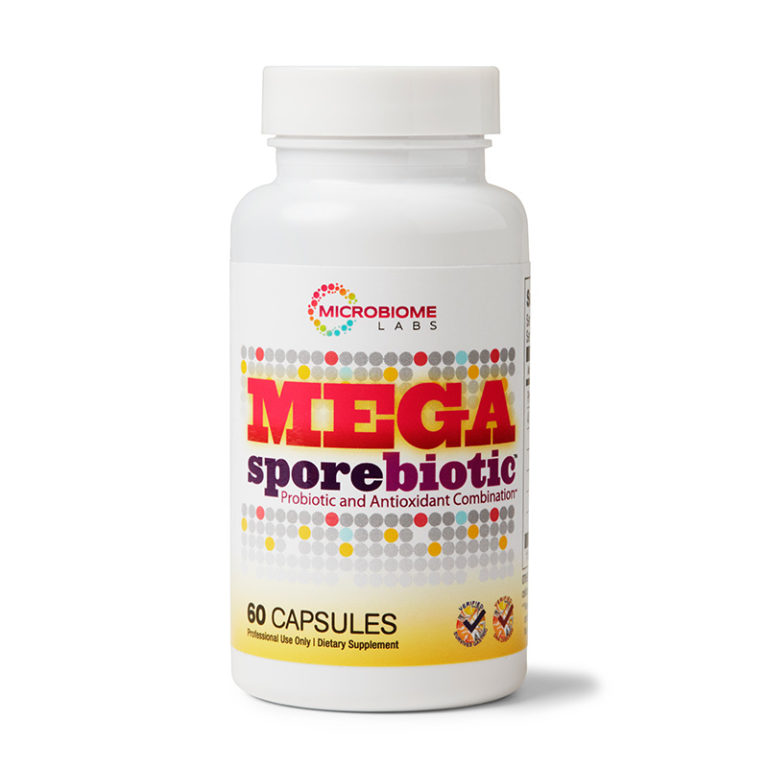
A probiotic supplement, it works to give support during and after H. pylori treatment. Not only has it been clinically shown to sustain healthy gut barrier function, but it also works to strengthen healthy gut mucosa.
It works to detoxify the intestinal tract, much-needed help when we are faced with a constant bombardment of chemicals in our environment and the food we consume. Cleaning out your gut works to rid it of sugars that bacteria love to feed on and helps to bring a balance within.
Frequently Asked Questions
You may still have some questions relating to H. pylori bacteria. To that end, we’ve rounded up some of the most frequently asked queries to make sure all your curiosities are answered.
How Long Does It Take for H. Pylori to Go Away?
If you choose to go the antibiotic route, sometimes referred to as triple therapy, where you take a combination of antibodies and an inhibitor, to reduce stomach acid, you can expect to experience relief within 14 days.
A test will follow this treatment to ensure that the bacteria has been eradicated from your body. If you are looking to do a natural treatment, there is no concrete timeline as results are still unclear, particularly depending on which natural approach you take. It’s also worth noting that stomach ulcers may take longer to disappear, depending on their severity.
Is Milk Good for H. Pylori?
Studies done using lactoferrin, a glycoprotein found in cow and human milk, have presented promising results against H. pylori infections. That said, the study was in tandem with the use of antibiotics (16). But wait, there’s more.
A compound known as melanoidin produced when sugar lactose and casein, a protein in milk, combine and create a chemical reaction, also shows reduced growth of H. pylori bacteria (17). This may prove to support a natural treatment for the bacteria.
What Will Happen If H. Pylori Goes Untreated?
Recall that we said that in many cases, H. pylori can have a protective effect on the body. But the role can change as we age, where we live, and how we treat our bodies. If you suspect yourself of having serious gastrointestinal issues, such as an ulcer, talk to your doctor first.
Chances are, if left untreated, it will continue to cause gastritis, an inflammation of the stomach lining. You may experience acute gastritis, that which is sudden, or gradual, that which happens over time. This inflammation can lead to peptic ulcers and in rare cases, cancer.
How Long Can You Live with H. Pylori?
Many people live their entire lives without ever knowing they have Helicobacter Pylori bacteria inside them. If you are experiencing an ulcer, although you can live with the uncomfortable symptoms for long periods, you should get it checked out as internal bleeding can occur if left untreated. This, in turn, could shorten your lifespan.
How Long Are You Contagious with H. Pylori?
So long as you are testing positive for the infection, you are still contagious. This means that you should avoid kissing and sharing bodily fluids with another person. Once the test shows that the bacteria have been eradicated, you are no longer considered contagious.
Does H. Pylori Make You Tired?
Yes. Nutrients give us energy, but H. pylori bacteria changes our ability to extract the necessary nutrients from food. Further to this, low stomach acid decreases our production and secretion of digestive enzymes in our stomachs and our absorption of nutrients is limited.
Overall, although most of us live with H. pylori bacteria, and it can be harmless, even protective to us, it’s always good to know how to handle it in case it does decide to turn bad and cause harm. First, if you are experiencing stomach issues, talk to your doctor and get yourself tested, including your microbiome.
Next, you can always take a preventative stance by consuming a dietary supplement of probiotics, or by eating food that is high in probiotics, to ensure a healthy bacteria balance within. To support this, wash your hands regularly, and know where your water source comes from.
Lastly, don’t panic if you suspect that you may have an infection. Whether you choose an antibiotic approach or a natural treatment for H. pylori, make sure you finish a full course of treatment. Remember, we do need both good and bad bacteria, it’s just a matter of keeping our levels balanced, much like having a balanced and healthy lifestyle.
NOTHING IN THIS WEBSITE IS INTENDED AS OR SHOULD BE CONSTRUED AS MEDICAL ADVICE. ANY HEALTHCARE AND/OR NUTRITIONAL MATERIAL CONTAINED IN THIS WEBSITE IS FOR CONSUMER INFORMATIONAL AND EDUCATIONAL PURPOSES ONLY. SUCH MATERIAL IS NOT INTENDED AS MEDICAL ADVICE FOR CONDITIONS OR TREATMENT, NOR IS IT INTENDED AS A SUBSTITUTE FOR A MEDICAL EXAMINATION BY A HEALTHCARE PROFESSIONAL. CONSUMERS SHOULD CONSULT THEIR OWN HEALTH CARE PROFESSIONALS FOR INDIVIDUAL MEDICAL RECOMMENDATIONS.
The above statements have not been evaluated by the FDA and are not intended to diagnose, treat or cure any disease.
Sources:
- Systematic review with meta‐analysis: the worldwide prevalence of Helicobacter pylori infection – Zamani – 2018 – Alimentary Pharmacology & Therapeutics – Wiley Online Library
- Helicobacter pylori (H. pylori): Symptoms, treatment, test, and more (medicalnewstoday.com)
- Treating H. pylori + SIBO – Gutbliss
- H. pylori Bacterial Infection: Causes, Symptoms, and Treatment (healthline.com)
- Helicobacter pylori (H. pylori) infection – Symptoms and causes – Mayo Clinic
- Disappearance of Helicobacter without antibiotics in 12 patients with gastritis – PubMed (nih.gov)
- Honey and green/black tea consumption may reduce the risk of Helicobacter pylori infection – PubMed (nih.gov)
- Tea | The Nutrition Source | Harvard T.H. Chan School of Public Health
- Honey: its medicinal property and antibacterial activity – PMC (nih.gov)
- Oral Broccoli Sprouts Eradicate Helicobacter Pylori Infection – International Specialty Supply (sproutnet.com)
- Sulforaphane: Uses, Benefits, Side Effects, Dosage, Precautions (verywellhealth.com)
- Non-pharmacological treatment of Helicobacter pylori – PMC (nih.gov)
- Blue light emitting diodes enhance the antivirulence effects of Curcumin against Helicobacter pylori | Microbiology Society (microbiologyresearch.org)
- Natural products and food components with anti-Helicobacter pylori activities – PMC (nih.gov)
- Natural products and food components with anti-Helicobacter pylori activities – PMC (nih.gov)
- Magnesium Threonate: An Honest Buying Guide for Health Enthusiasts - March 21, 2024
- Magnesium Citrate Vs Glycinate: 5 Key Differences And Benefits - March 14, 2024
- How to Pick the Best Magnesium Glycinate Supplement for You - March 7, 2024
